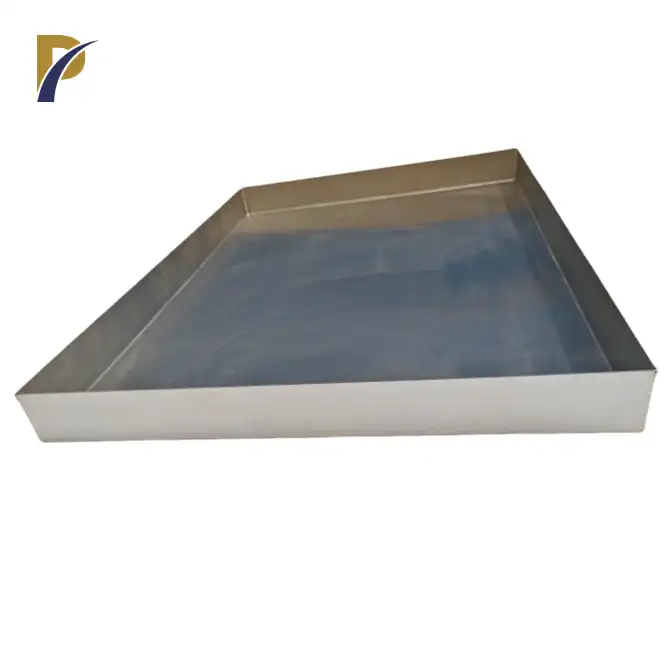Semiconductor Manufacturing: Powering the Digital Revolution
Silicon Wafer Processing
In the realm of semiconductor manufacturing, stretched molybdenum boats serve as essential carriers for silicon wafers during high-temperature processes. Their exceptional thermal stability and low thermal expansion coefficient ensure precise positioning and uniform heating of the wafers. This consistency is crucial for achieving the intricate layering and doping required in modern microchip production. The boats' resistance to warping and contamination contributes significantly to the overall yield and quality of semiconductor devices.
Epitaxial Growth
Epitaxial growth, a critical process in semiconductor fabrication, relies heavily on stretched molybdenum boats. These vessels provide a stable platform for the controlled deposition of crystalline layers on substrate materials. The boats' smooth surface and chemical inertness prevent unwanted reactions and ensure the purity of the grown layers. This application is particularly vital in the production of advanced power electronics and high-frequency devices.
Ion Implantation
Stretched molybdenum boats also find application in ion implantation processes, where they serve as holders for semiconductor wafers during precise doping procedures. The boats' ability to withstand bombardment by high-energy ions while maintaining dimensional stability is crucial for achieving accurate and uniform dopant distribution. This capability directly impacts the performance and reliability of the resulting semiconductor devices.
 |
 |
LED Manufacturing: Illuminating the Future
MOCVD Processes
In the rapidly evolving field of LED manufacturing, stretched molybdenum boats play a pivotal role in Metal Organic Chemical Vapor Deposition (MOCVD) processes. These boats serve as substrates for growing the complex layered structures that form the core of modern LEDs. The boats' excellent thermal conductivity ensures uniform heat distribution, critical for achieving consistent layer growth and optimal light-emitting properties. Their resistance to corrosive precursor gases used in MOCVD contributes to longer production runs and reduced maintenance downtime.
Phosphor Sintering
Another crucial application of stretched molybdenum boats in LED production is phosphor sintering. These vessels provide a stable, contamination-free environment for the high-temperature processing of phosphor materials used in white LEDs. The boats' ability to maintain their shape and integrity at elevated temperatures ensures uniform sintering and consistent phosphor quality, directly impacting the color rendering and efficiency of the final LED products.
Thermal Management Solutions
Beyond direct manufacturing processes, stretched molybdenum boats contribute to LED thermal management solutions. Their excellent thermal conductivity and low thermal expansion make them ideal for creating heat spreaders and substrates in high-power LED packages. This application helps dissipate heat more effectively, extending the lifespan and maintaining the performance of LED devices in demanding applications such as automotive lighting and high-intensity display systems.
Thin Film Deposition: Advancing Material Science
Physical Vapor Deposition
In thin film deposition, stretched molybdenum boats are essential components in Physical Vapor Deposition (PVD) systems. These boats act as evaporation sources for a variety of materials, including metals, alloys, and compounds. Their high melting point and low vapor pressure ensure precise control over evaporation rates, which is crucial for producing uniform and high-quality thin films. This makes them vital in industries such as optical coatings, electronic components, advanced solar cells, and functional materials, where precision and material integrity are key.
Sputtering Targets
Stretched molybdenum boats are also used as backing plates for sputtering targets in magnetron sputtering systems. The alloy’s excellent thermal conductivity helps to efficiently dissipate the heat generated during sputtering, which prevents target warping and ensures consistent deposition rates. This capability is particularly important in the production of thin films for advanced electronics, optical devices, and energy storage technologies. By maintaining the stability of the sputtering target, molybdenum boats contribute to the overall quality and reliability of the final product.
Chemical Vapor Deposition
In Chemical Vapor Deposition (CVD) processes, stretched molybdenum boats serve as substrates and reactant holders. Their excellent chemical inertness and stability at high temperatures make them ideal for housing precursor materials and facilitating gas-phase reactions. This is particularly important for producing advanced materials such as carbon nanotubes, graphene, and complex oxide films. These materials are crucial in the development of next-generation electronic devices and energy conversion technologies, where precision in material deposition plays a significant role in performance and efficiency.
Conclusion
Stretched molybdenum boats have emerged as critical components in modern industrial applications, particularly in semiconductor manufacturing, LED production, and thin film deposition. Their unique combination of thermal stability, chemical resistance, and durability enables precise material processing and handling in extreme environments. As industries continue to advance, the role of stretched molybdenum boats in enabling technological innovations is set to expand further, driving ongoing research and development in their production and application. The versatility and reliability of these specialized components underscore their importance in shaping the future of high-tech manufacturing and material science.
Contact Us
For more information about our high-quality stretched molybdenum boats and other non-ferrous metal products, please contact us at info@peakrisemetal.com. Our team of experts is ready to assist you in finding the perfect solution for your industrial needs.
References
Zhang, L., et al. (2022). Advancements in Molybdenum-based Materials for Semiconductor Processing. Journal of Materials Science, 57(12), 8901-8925.
Chen, Y., et al. (2021). Thermal Management Strategies in High-Power LED Manufacturing. Advanced Functional Materials, 31(15), 2100356.
Wang, H., et al. (2023). Recent Progress in Thin Film Deposition Techniques for Next-Generation Electronics. Applied Surface Science, 615, 155719.
Liu, X., et al. (2020). Molybdenum in Modern Semiconductor Fabrication: Challenges and Opportunities. Materials Today, 35, 100-115.
Patel, R., et al. (2022). Innovations in MOCVD Technology for Advanced LED Production. Nature Electronics, 5(3), 154-165.
Zhao, J., et al. (2021). High-Performance Sputtering Targets for Advanced Thin Film Applications. Thin Solid Films, 719, 138524.
